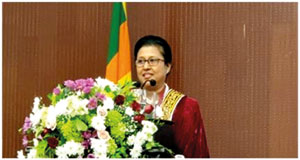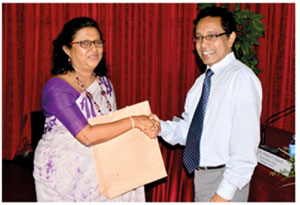Biotechnology for a Sustainable Future – Symposia Series by SLAAS

Prof. Preethi Udagama, General President of SLAAS
When people think of biotechnology, most assume it’s a new concept. Actually, mankind has been using biotechnology for thousands of years. From selective breeding of food crops and animals to brewing beer and making bread from yeast, traditional biotechnology has been an integral part of our lives. Modern biotechnology has been in place for the past 50 years. Genetic engineering and recombinant DNA technology are exciting areas that create new genetic material for various applications in science, medicine, agriculture and industry.
So what is biotechnology? In a nutshell, it is a branch of science and technology that deals with using living organisms, their products or their biological processes to develop technologies and products that help improve our lives and the health of the planet.
Biotechnology transverses
various sectors and is very
much a part of our lives

Prof. Preethi Udagama (General President, SLAAS) with Dr. Sirimal Premakumara, keynote speaker at the 1st Biotech Symposium (May 2019)
Today, biotechnology is used in a multitude of sectors and is an essential part of our lives.
The biggest branch is industrial – this consists of the use of microorganisms to chemically produce wine, bread or beer using yeast, biodegradable polymers, and enzymes and microorganisms. It also includes producing fuel from renewable sources and designing processes and products to consume less resources and energy compared to older methods.
The next most prominent application of biotechnology is in the medical and pharmaceutical sector. Creating biopharmaceuticals such as human insulin for diabetics, vaccines that prevent countless of diseases and monoclonal antibodies that are used for treatment, are just some of the many applications of biotechnology in the medical sector. Medical biotechnology also involves creating advanced techniques such as stem cell therapy, gene therapy, precision medicine and molecular medicine to treat various diseases. There have been many breakthroughs in diseases that we once thought could not be treated, such as blindness, HIV infections and genetic defects in human embryos by using biotechnology. Even in cancer, we are now able to identify genes involved in cancer development, and provide therapy options based on this.
Biotechnology is also useful for reproductive purposes, providingremedies for infertility and subfertility. The first Sri Lankan test tube baby is now 18 years old – this success story and others in the country is ample proof for the ability of locally-trained manpower in the use of reproductive biotechniques to improve quality of life. Furthermore, use of these techniques help sustain livestock productivity, which is being investigated locally. Reproductive biotechnology is an open area for research with much scope in Sri Lanka.
Shifting towards agriculture, biotechnology has a major role to play nowadays. From controlling pests and pathogens that hamper our crops, to producing fertilisers to boost productivity, and creating genetically modified organisms (GMOs) with enhanced characteristics such as Golden Rice fortified with Vit A to help prevent blindness, there are many positive impacts on agriculture.

SLAAS 1st Biotech Symposium on Traditional knowledge-based Biotechnology (May 2019). Prof. Chamari Hettiarachchi (Secretary, SLAAS S& T Advisory Committee ), Prof. Preethi Udagama (General President, SLAAS), Chief Guest Mr. Chinthaka S Lokuhetti (Secretary, Ministry of Science, Technology & Resaerch, Dr. Sirimal Premakumara (Keynote speaker) and Dr Chinthaka L de Silva (General Secretary, SLAAS)
Biotechnology is also vital for the environment and conservation. The field of environmental biotechnology uses microorganisms to improve the environment, such as creating green energy from organic and biomass waste, using oil-eating microorganisms to clean up oil spills, converting toxic substances to non-toxic and so on. It’s also an essential tool for conservation of biological diversity.
There are other sectors of biotechnology such as aquatic biotechnology, which tackles efficient use of the ocean and freshwater resources for services and products and nutritional biotechnology, which deals with nourishing and fortifying food with health promoting additives.
Bioinformatics and Nanobiotechnology is another upcoming and exciting sector of biotechnology. This deals with phylogenetics – which is the study of evolutionary relationships and identification of disease linked genes, forensic science and molecular modelling. In nanobiotechnology, tools from nanotechnology are harnessed to study biological processes, such as using sensors to deliver biomolecules in our cells.
Another important side to consider are legal, ethical and philosophical aspects of biotechnology. There are current developing trends – for this it is vital to educate people about biotechnology and create awareness for the need of it.
Biotechnology is relevant and growing in Sri Lanka
In Sri Lanka, biotechnology was adopted as a national policy in 2010, to harness as a tool for socio-economic development and boost opportunities for local industries. This includes enhancing food production, improving healthcare, incorporating industrial techniques as well as promoting bioenergy, biodiversity conservation and clean energy. An apex body for biotechnology – Coordinating Secretariat for Science, Technology Innovation (COSTI) was established in 2013. The National Biotechnology Council was set up under COSTI to plan, coordinate, monitor and evaluate all activities related to biotechnology including facilitating and supporting bio-industries while ensuring safe and ethical practices.
One of the key aspects of the National Biotechnology Policy is to support research and development, as well as boost human resources in biotechnology. As such, parts of biotechnology have been included in the national AL Biology syllabus, various special degree programmes related to biotechnology have been established in state universities, the subject biotechnology has been included in the undergraduate curriculum, and numerous postgraduate opportunities have arisen in the field. There are also several biotechnology jobs available in the country, mainly in the agriculture, industrial and medical sector. That’s not all – steps have been taken to establish a biotechnology parkin the near future in Sri Lanka.
Symposia Series by SLAAS
In keeping with this vital role that biotechnology has in the country, the Sri Lanka Association for the Advancement of Science (SLAAS) has organised a series of Biotechnology symposia for 2019. This year’s theme was conceptualised by the incumbent General President of SLAAS – Prof. Preethi Udagama, who is a Senior Professor in Zoology, University of Colombo and is organised by the Science & Technology Advisory Committee, SLAAS, in collaboration with the Ministry of Science, Technology & Research.
The objective of this symposia is to discuss the various areas and applications of biotechnology– Medical, Reproductive, Environmental, Industrial, Aquatic, Nanobiotechnology and Bioinformaticsin the context of Sri Lanka, while considering the ethical, legal and social implications. While sharing information, this is also a useful opportunity to keep track of all the biotechnology research carried out in the past and present in Sri Lanka, and determine the gaps to be addressed in the future.
According to Prof. Preethi “Biotechnology research carried out in Sri Lanka should produce marketable outputs and innovations that will ultimately contribute to the GDP of the nation. This symposia series showcases biotech research carried out in Sri Lanka and is aimed at educating the general public in biotechnology, as well as building collaborations for research and development. Furthermore, SLAAS is collecting comprehensive information on ‘Biotechnology Research & Applications Landscape of Sri Lanka: past perspectives, current status & future trends’ to compile a report that is useful to the Ministry of Science, Technology and Research, and for funding agencies to identify future directions/needs of biotech research in the country for revenue generation.”
A total of seven symposia have been scheduled over the entire year, to be held in various locations, and are free for all to attend. So far, four successful talks have been hosted, attracting close to 450 participants in total, covering 1) Traditional knowledge-based biotechnologies in Sri Lanka; 2) Reproductive biotechnology; 3) Medical biotechnology and 4) Agriculture biotechnology.A fifth session on Nanobiotechnology & Bioinformatics is scheduled to be held on October 17th 2019.
What’s great about these sessions is that they involve leading state universities throughout the country, as well as private research centres, ensuring that all relevant parties in Sri Lanka are included. SLAAS has brought together many prominent stakeholders, distinguished academics and brilliant research minds, from both Sri Lanka and overseas, to ensure the success of these talks.
So far, the sessions have had effective keynote speeches from Dr.Sirimal Premakumara – Faculty of Nursing, University of Colombo;Prof.Harshalal Senevirathne, Faculty of Medicine, University of Colombo; Prof. Charani Ranasinghe, The John Curtin School of Medical Research, Australian National University; and Dr. Pooja Bhatnagar-Mathur, International Crops Research Institute for the Semi-Arid Tropics Consortium, India, who have shared their knowledge and findings to help pave the way for further biotechnology development in the country. To support each symposium, prominent resource persons affiliated to a variety of institutes share their expertise and research, bringing a well-rounded outlook on this important field.
The general public is warmly welcomed to attend these symposia and learn more about biotechnology and its impact for a sustainable future in Sri Lanka. The sessions are free to attendwith lunch and refreshments provided, but require online pre-registration (please see www.slaas.lk for link, or contact 011-2688740SLAAS Head Quarters for more info).
Written by
Dimuthu Sachiko de Silva
based on information provided by Prof. PreethiUdagama, Incumbent General President of SLAAS.


